WASHINGTON — Millions of women gathered in Washington and cities around the country and the world Saturday to mount a roaring rejoinder to the inauguration of President Donald Trump. What started as a Facebook post by a Hawaii retiree became a historic international rebuke of new president that packed cities large and small – from London to Los Angeles, Paris to Park City, Utah, Miami to Melbourne, Australia.
In Chicago, the demonstration was overwhelmed by its own size, forcing officials to curtail its planned march when the crowd threatened to swamp the planned route.
The Washington organizers, who originally sought a permit for a gathering of 200,000, said Saturday that as many as a half million people participated.
Similar mass gatherings took place around the country, with march organizers listing more than 670 planned events nationwide and in another 70 cities around the world, including Tel Aviv, Barcelona, Mexico City, Berlin and Yellowknife in Canada’s Northwest Territories .
In Chicago, after 150,000 demonstrators swamped downtown blocks, officials cancelled the march portion of the event. In Boston, police estimated a gathering of 125,000. In Los Angeles, officials temporarily closed some side streets to accommodate the crowds.
“We are doing our best to facilitate because they are squeezing into every street right now,” said Capt. Andrew Nieman of the Los Angeles Police Department.
There were huge gatherings in New York, Miami, Denver and Seattle. In Juneau, Alaska, one man marveled that the crowd was the biggest he had ever seen on the state Capitol’s steps.
In Philadelphia, marchers filled city bridges. In Lexington, Kentucky, they shut down streets. In New Orleans, Louisiana, they played brass instruments. The fear – and anger – at Trump’s rise to the most powerful position in the United States reverberated at renowned protest sites around the globe, from the Trocadero in Paris to Trafalgar Square in London.
Marina Knight, a 43-year-old executive assistant, and her 9-year-old daughter were two of the tens of thousands marching in London.
“This is her first march,” Knight said, referring to her daughter. “It’s the first time we felt it was vital to march. I feel the rights we take for granted could go backwards, and we owe it to our daughters and the next generation to fix this somehow.”
In the United States, the crowds marched in weather ranging from balmy to snowy. But common to every gathering was fiery rhetoric, pink knit hats, and repeated references to the boast that offended so many women: Trump’s infamous taped comments about groping female genitals.
Among the thousands of signs marchers dumped at the end of the day in front of the Trump International Hotel, just blocks from the White House: “P—y Power” and “This P—y Bites Back.”
In Washington, demonstrators came from around the country, sometimes sleeping on the couches of people they had never met before. More than 470,000 people had taken Metro by 1 p.m., a weekend ridership record. (By 11 a.m. on Inauguration Day, 193,000 trips had been taken.) The city issued about 1,800 bus parking permits for the event, and Amtrak added extra trains in and out of Union Station.
Many said they wanted to take the most public possible stand against Trump, a candidate and now president whom they said routinely insults women and the issues they care about. But the gathering also provided a balm for many eager to immerse themselves in a like-minded sea of citizens who shared their anxiety and disappointment after Democrat Hillary Clinton’s historic bid for the presidency ended in defeat.
Clinton tweeted her gratitude as the rally got underway at 10 a.m., telling them: “Thanks for standing, speaking & marching for our values womensmarch. Important as ever. I truly believe we’re always stronger together.”
Feminist icon Gloria Steinem, 82, who was among the first speakers, looked out over the huge crowd and exulted, “This is the upside of the downside. This is an outpouring of democracy like I’ve never seen in my very long life.”
Around the Mall, the sound system failed to reach everyone in the massive crowd, and far more portable toilets were needed.
When the port-a-potties behind the stage broke down, security instructed women to use cups and ushered them into a box truck for privacy.
“I’m afraid to shake anyone’s hand,” one woman joked.
Though the marchers were mostly female and white, men and people of color also joined the throngs.
Cynthia English, a 61-year-old Jamaican-American living in Florida, said she wanted the new president to know that women will be fighting during his presidency to ensure that the country and laws treat them equally. She was with her daughter and marching for her two granddaughters in that hope that no future president feels comfortable making lewd comments about women.
“I don’t want this to happen to them 20 years from now, so I am making my mark now,” English said. “Why are we the ones that bring people into this world, and we are treated the worst? We should be treated with respect.”
The crowd was buoyant, even joyous. Many held up signs – “I Am Very Upset!” and “Love Trumps Hate” and “Bridges Not Walls” – while others took videos of the moment on their cell phones. Every few minutes, a rolling roar swept over them, echoing through the concrete concourse.
District of Columbia police said they had made no march-related arrests, compared to more than 200 when protesters created chaos in downtown Washington.
March organizers briefly considered suspending the formal march to the Ellipse out of concern that the crowd had grown too large to safely navigate the route to the White House. But speakers soon told the marchers to set out.
Lorraine LaHuta, 66, who came to the march from New York City, said at times she wasn’t sure where to go, but it never chaotic. “It was organized disorganization that worked very well,” she said.
Judith Snyder-Wagner was among those eager to join the crowd. The 67-year-old former fundraising consultant said she has sensed a shift in the rural, blue-collar community near Canton, Ohio, where she lives with her wife, Joy. A neighbor mowed a piece of grass along their property line and put up a Trump sign facing their home. Someone recently drove through the neighborhood flying a Confederate flag.
“We’ve been afraid,” Judith Snyder-Wagner said, her voice quavering. She was limping up the sidewalk on Independence Avenue. She has had both her knee and hip replaced, and she held a cane in one hand and a poster in the other. “We just feel like we’re going to lose our civil rights.”
The couple boarded a bus at 1 a.m. Saturday in Ohio and would head home less than 24 hours later. “We needed to feel inspired,” Joy Snyder-Wagner said, looking around. “And we do.”
Trump’s election was the wake up call that progressives needed, said Erin Edlow, 28, the membership director of the Virginia Beach Young Democrats. She was in town with her sister to demonstrate her support for LGBT and immigrant rights.
“Democracy is not a spectator sport,” she said.
The march turned into the weekend’s star-studded event, with celebrities including Janelle Monáe, Scarlett Johansson and Ashley Judd making appearances. Bowser introduced herself as a proud “chick mayor” and implored the Republican majority in Congress to stop meddling in the District’s local lawmaking.
Activist filmmaker Michael Moore ripped The Washington Post in half, noting the headline “Trump Takes Power” and declaring “I don’t think so.” Actress America Ferrera declared that “our new president is waging a war” on the values that define the country with “a credo of hate fear and suspicion of one another.”
“It’s been a heart-rending time to be both a woman and an immigrant,” said Ferrera, whose parents are from Honduras. “Our dignity, our character, our rights have been under attack.”
“But the president is not America,” she said. “We are America.”
As the march grew in prominence, it highlighted long-existing racial and political rifts in the feminist movement. The initial organizers of the march were white women, though they quickly handed its leadership over to a diverse group of veteran organizers from New York.
They have embraced an imperiled liberal agenda, in sharp contrast to much of what Trump laid out for his presidency. The platform calls for ending violence against women, workers’ rights, reproductive rights, environmental justice, immigrant rights and more.
But a group of anti-abortion women also came, beseeching the larger march to recognize their variety of feminism. Whether or not to include the conservative viewpoint sparked controversy in the days before the march. Anti-abortion women said they were excluded.
Siobhan Rooney, 32, drove from Philadelphia this morning to march for women’s rights. For her that includes the rights of their unborn children.
“We are in the same page on so many issues. It’s just this one issue,”she said.
With a golden retriever service dog, Fargo, by her side, U.S. Army veteran Khai Willson walked toward the marchers with a sign in her hand: “I served for better than this.”
Willson said she is well positioned to influence Trump supporters who might be otherwise difficult to persuade: She’s white, middle class and a veteran.
“I have a lot of privilege,” said Willson, now a freelance copywriter. “I have to use that to engage with people.”
John Fisher, a 34-year-old locksmith from Grand Rapids, Michigan, drove more than nine hours with his wife Kara Eagle.
I’m here to support my wife,” said Fischer. “I don’t care who you are, women impact your life and there’s no reason why they shouldn’t have the same rights as men.”
Copy the Story LinkSend questions/comments to the editors.

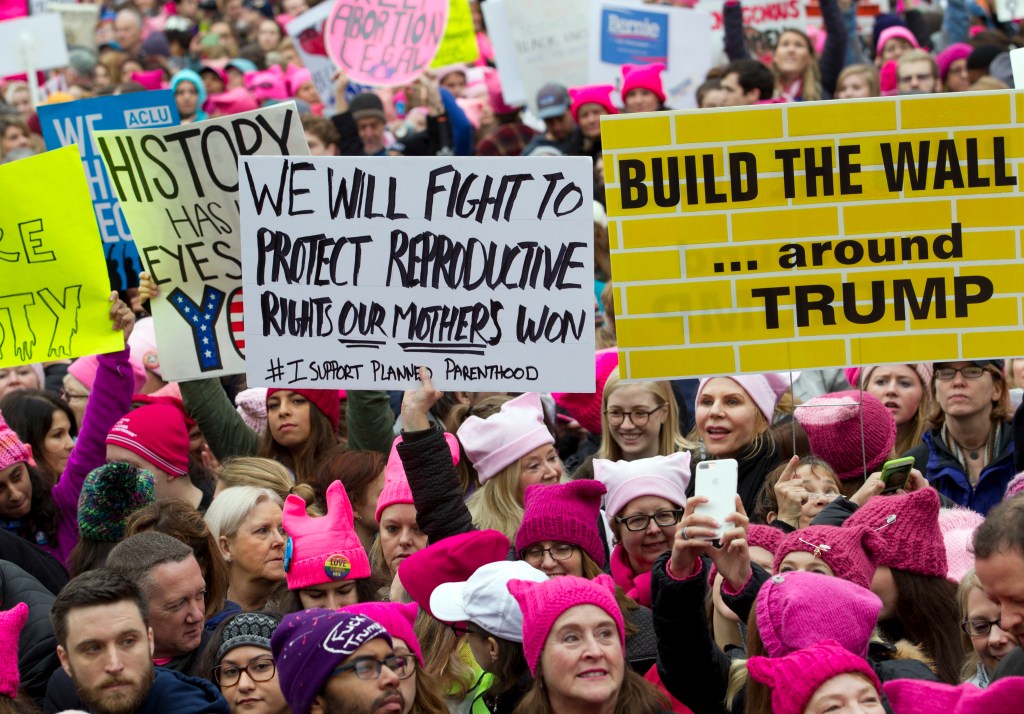
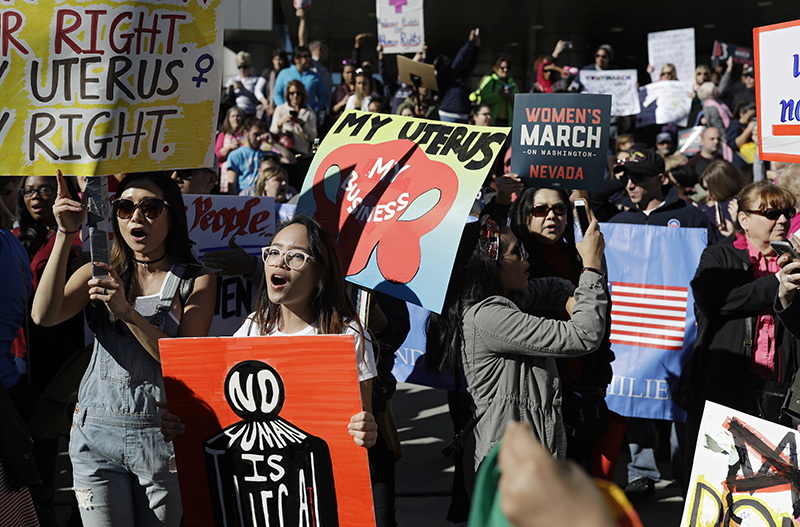
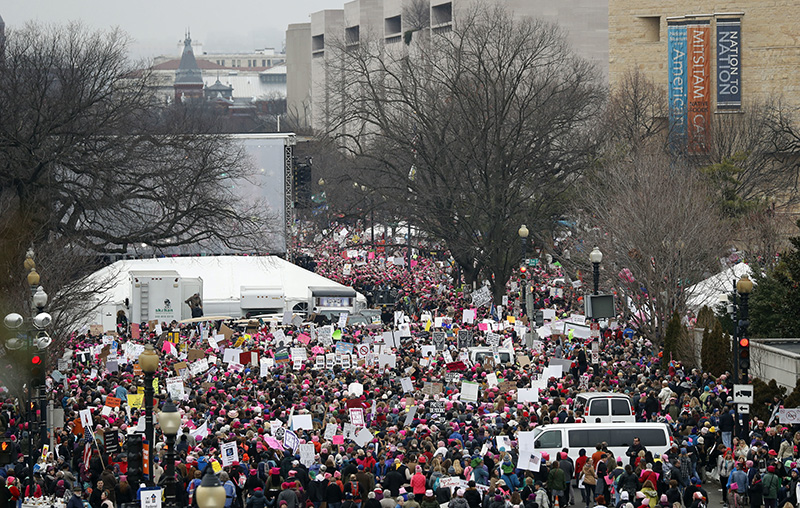
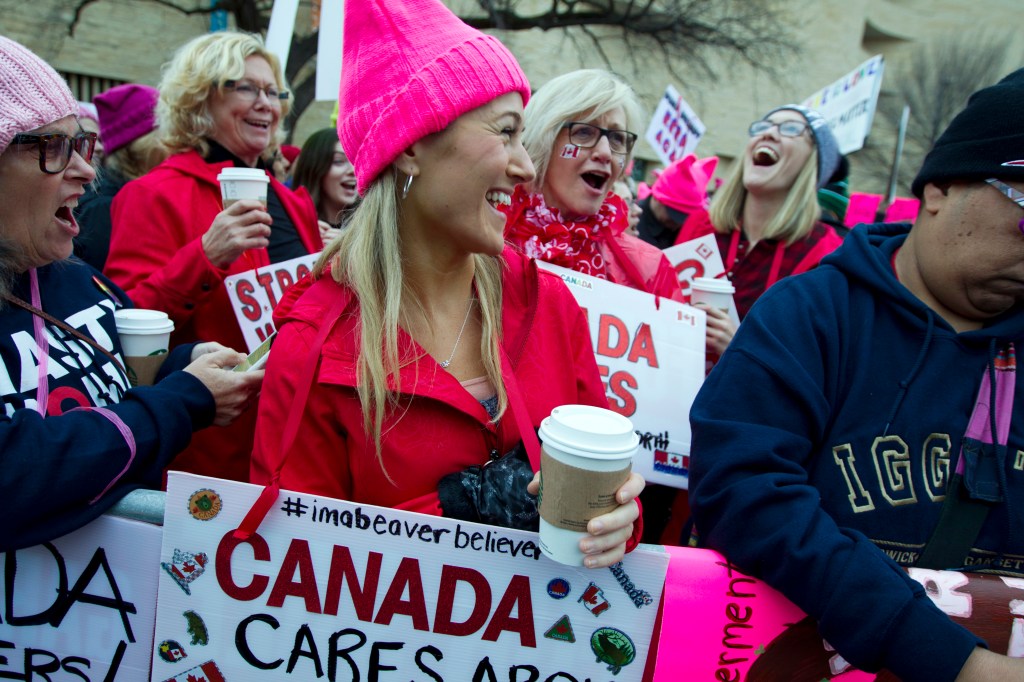
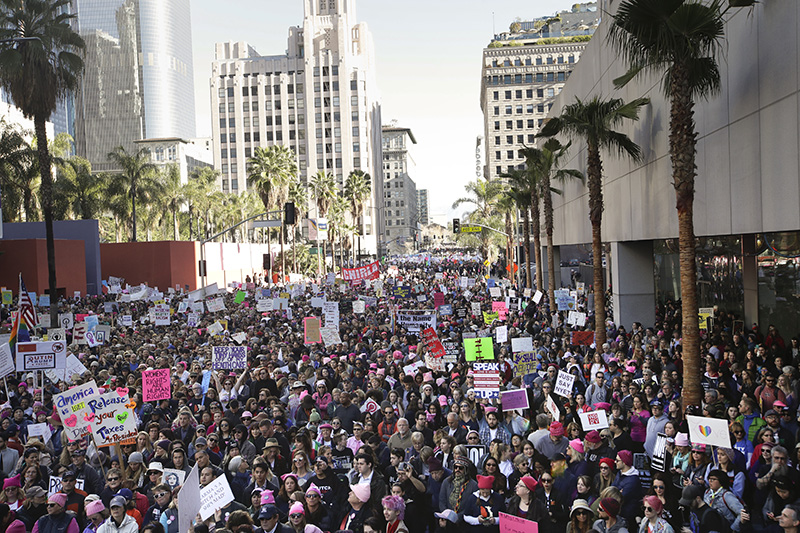
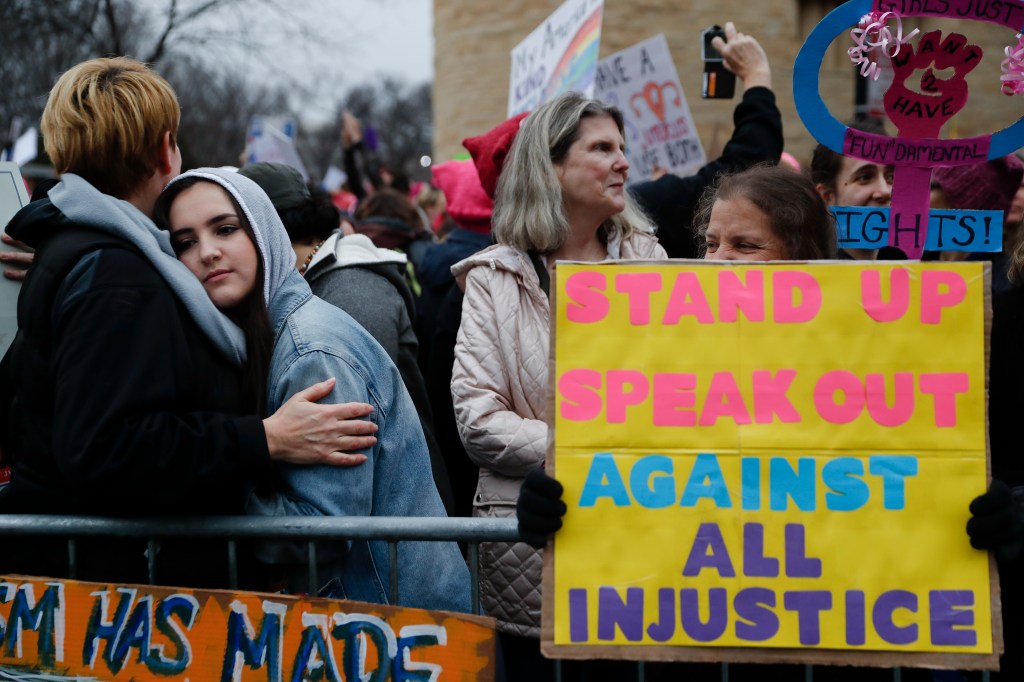
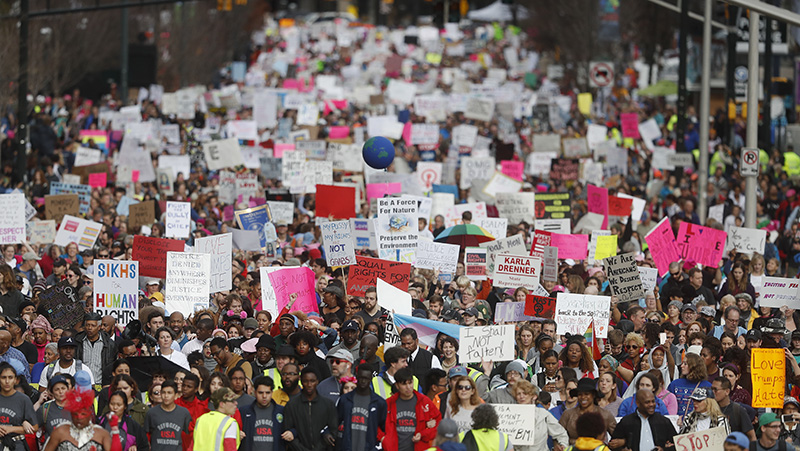
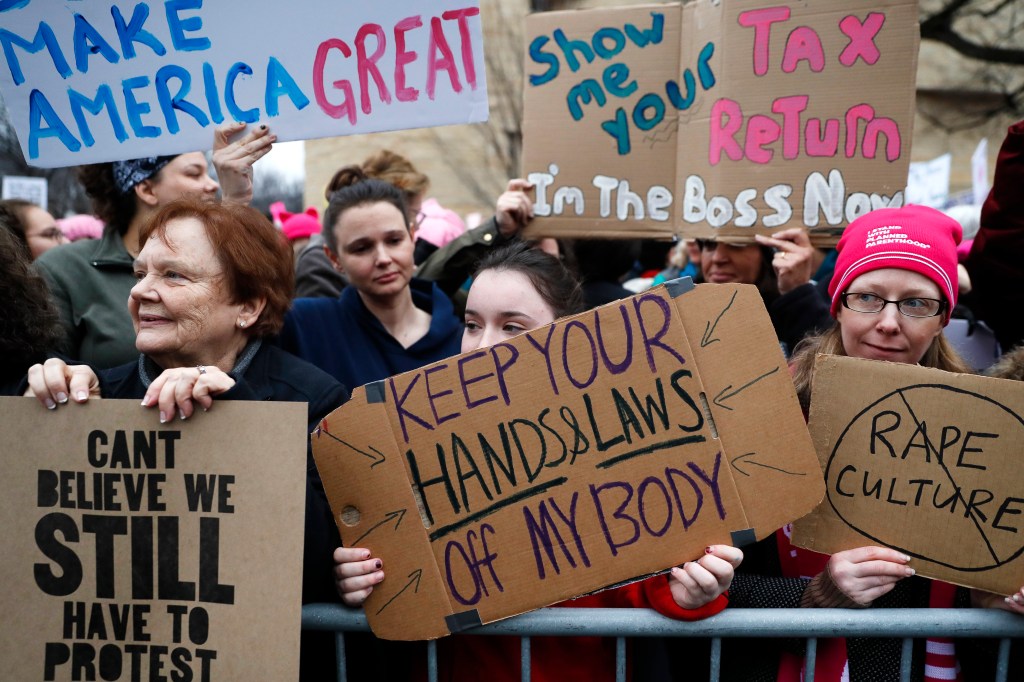
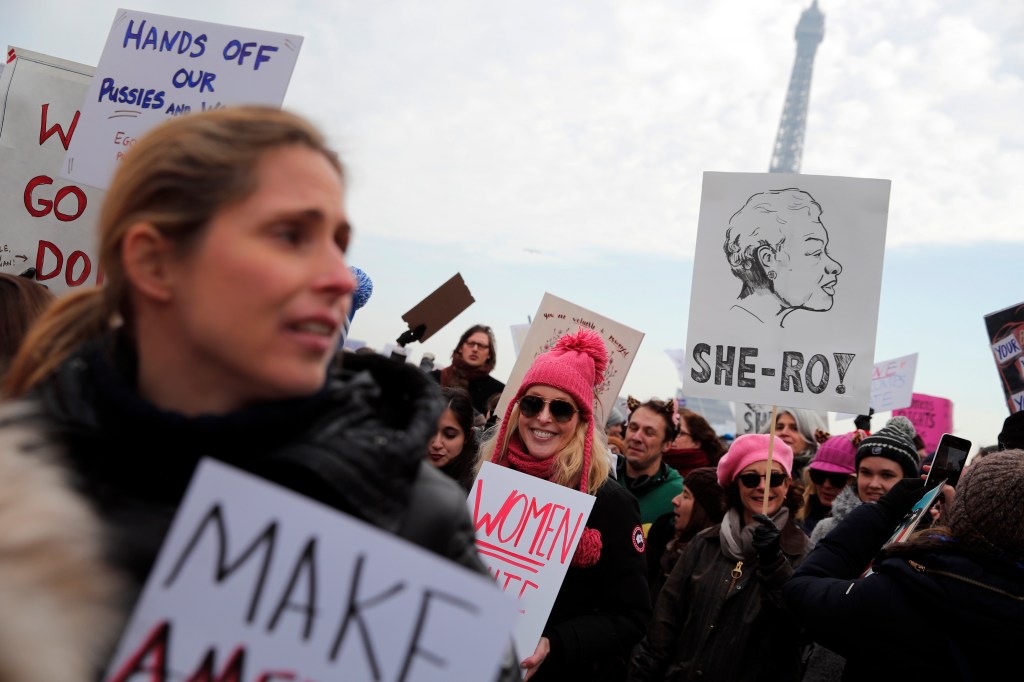
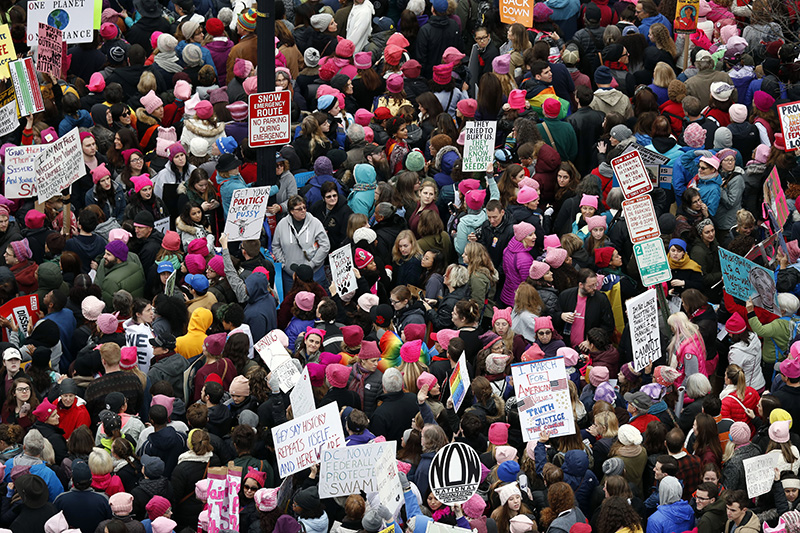
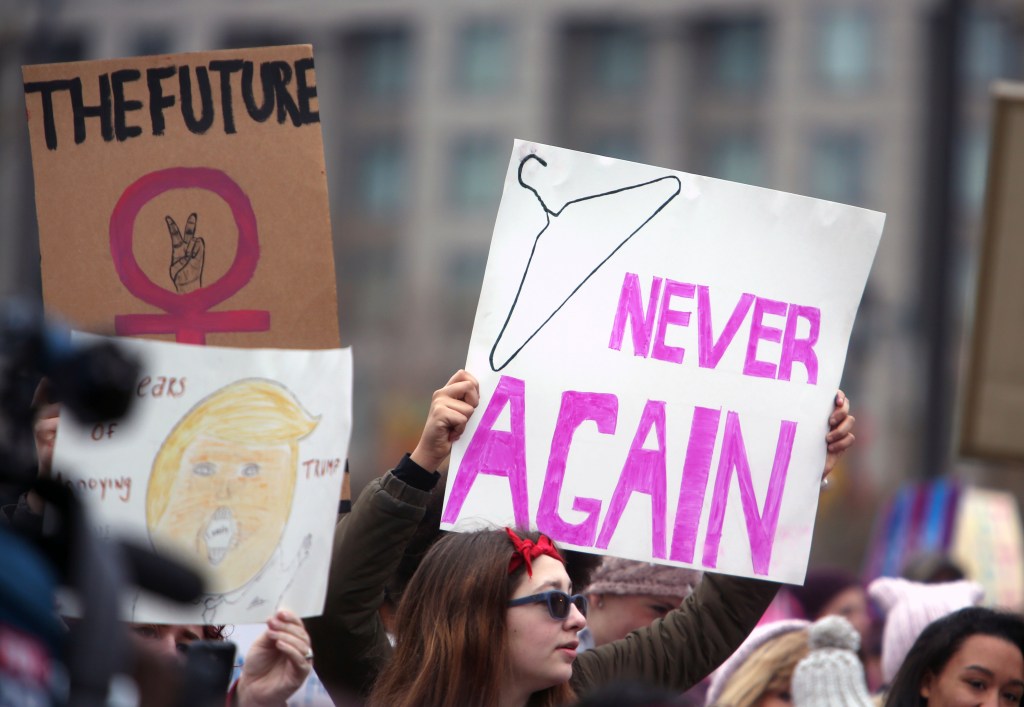
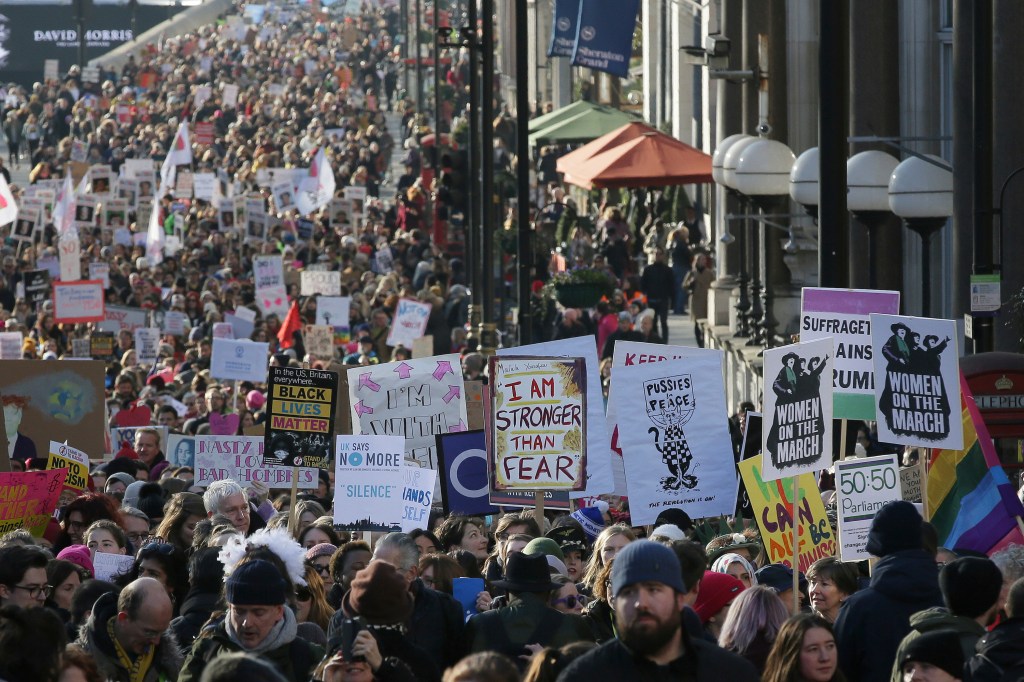
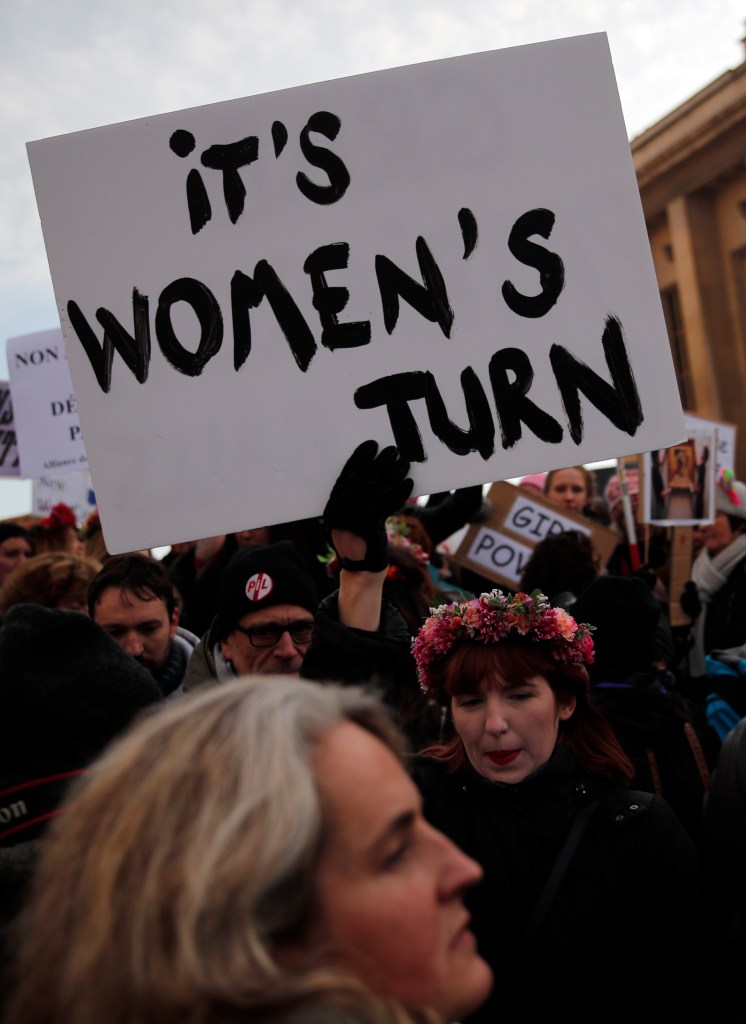
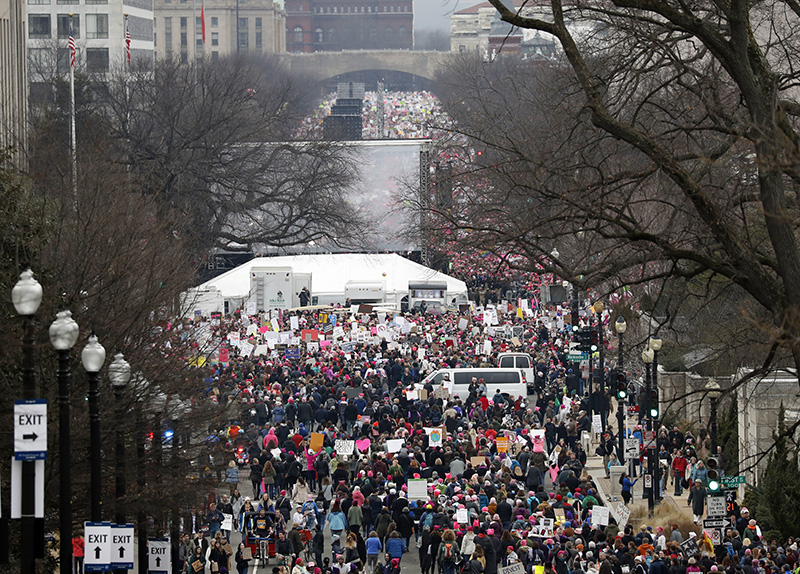
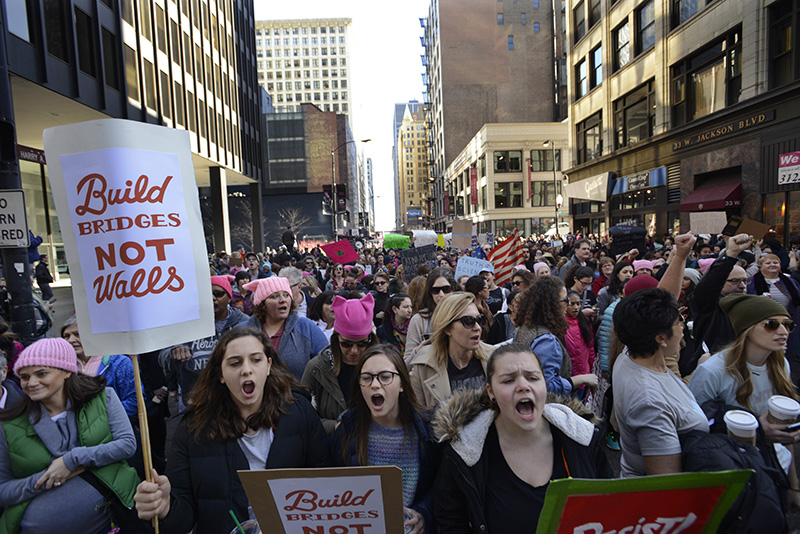
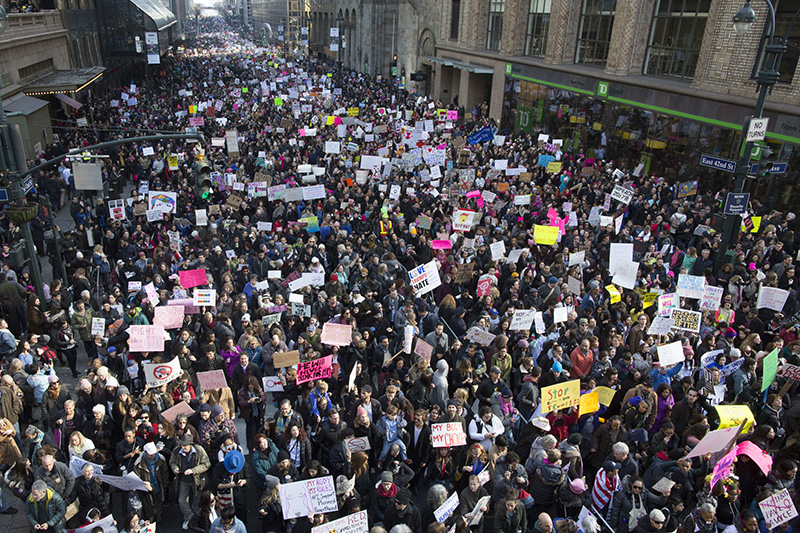

Success. Please wait for the page to reload. If the page does not reload within 5 seconds, please refresh the page.
Enter your email and password to access comments.
Hi, to comment on stories you must . This profile is in addition to your subscription and website login.
Already have a commenting profile? .
Invalid username/password.
Please check your email to confirm and complete your registration.
Only subscribers are eligible to post comments. Please subscribe or login first for digital access. Here’s why.
Use the form below to reset your password. When you've submitted your account email, we will send an email with a reset code.